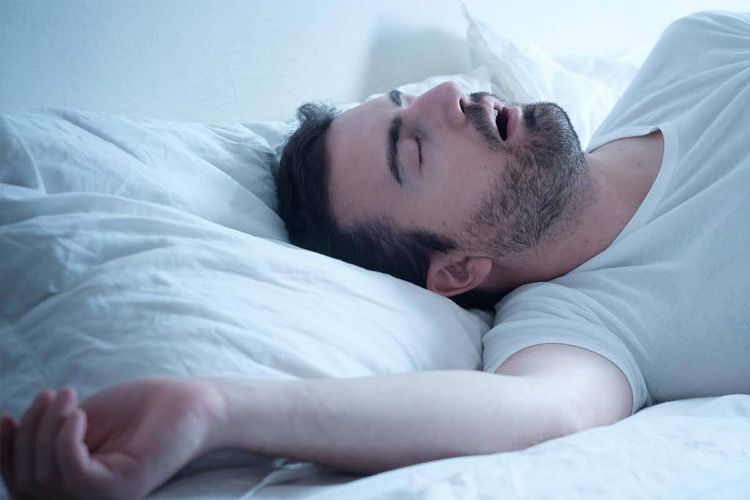Are you waking up with headaches or tight jaw muscles? Perhaps you have noticed increased tooth sensitivity. If so, you could be experiencing some symptoms of sleep apnea. For many people, regardless of how much sleep they get or practice good sleep habits, they still do not get enough. If you have tried multiple sleeping methods, but are still struggling, you may have a sleep disorder.
What Is Sleep Apnea?
Sleep apnea is a sleep disorder where their throat muscles obstruct the nasal passageways and airways. As a result of this obstruction, the person will momentarily stop breathing. This stoppage can occur several times throughout the time.
The National Sleep Foundation has suggested that almost one in four people who have obstructive sleep apnea also grind their teeth whilst they sleep. Surprisingly, men can often be more affected by this than women.
Sleep Apnea and Teeth Grinding
Not many people are aware that there is a connection between sleep apnea and teeth grinding. Some symptoms of sleep apnea can often be teeth grinding itself or symptoms of teeth grinding.
Teeth grinding is a common sleep disorder that affects around 31% of the population. This sleep condition is also known as bruxism. If you grind your teeth, then you need to be aware that teeth grinding can often be caused by sleep apnea. If you are aware that you grind your teeth, you may have undiagnosed sleep apnea.
Common Symptoms of Sleep Apnea
If you have found yourself waking up with headaches or earaches, you may be grinding your teeth during the night. Whilst sleep apnea itself can be difficult to diagnose, there are some common symptoms of associated teeth grinding. These teeth grinding symptoms include:
- Feeling Excessively Tired
- Mood Swings
- Tight Jaw Muscles
- Teeth Sensitivity
- Headache
- Earache
- Loud Snoring
- Insomnia (difficulty sleeping)
- Waking with a Dry Mouth
- Sore Throat
- Waking with Shortness of Breath or Gasping
- Frequent Bathroom Visits at Night
- Memory Problems
- Concentration Issues
As you can see, there are many different signs of teeth grinding in adults. If you are experiencing any or several of the above, you could have sleep apnea.
Symptoms of Sleep Apnea in Children
Whether you were aware or not, children can experience sleep apnea and conditions such as teeth grinding too. While a few of the symptoms are similar to those in adults, there are some variations to look out for.
What is important to be aware of for sleep apnea in children is that they can often be similar to signs of ADHD. If your child has developed a poor attention span or is struggling at school, they may have undiagnosed sleep apnea. It is always a good idea to speak through your concerns with a doctor so that they can help find a solution to your child’s circumstance.
Some other symptoms to look out for include:
- Difficulty Learning
- Excessive Tiredness
- Snoring
- Heavy Mouth Breathing (awake and asleep)
- Bedwetting
- Stops Breathing Repeating During Sleep
The Risks of Untreated Sleep Apnea and Teeth Grinding

As with any other medical condition, this sleep disorder is no different. If sleep apnea and teeth grinding go untreated then it can put you at risk of other serious health issues. Some of these health issues can include acid reflux, type 2 diabetes, mental health problems, memory loss, lower immune function, and increased risk of heart failure or stroke.
Not only all that, but teeth grinding provides its own set of risks too. If you grind your teeth at night and are prolonging treatment, you could experience:
- Highly Sensitive Teeth
- Broken Teeth
- Loosened Teeth
- Damaged Enamel
- Loosened Fillings
However, there is light at the end of the tunnel! There are some great remedies that you can try to help treat your sleep apnea and teeth grinding. As a result, your sleep quality will also be improved.
Tips for Getting Better Sleep by Eliminating Sleep Apnea and Bruxism
There are plenty of things you could be doing to try and treat your sleep apnea and bruxism (teeth grinding). Some of these methods include:
Maintain a Healthy Weight – airway obstruction is far more likely to occur in obese people
Yoga – to help improve your respiratory strength
Quit Smoking – smoking causes inflammation in the throat which can lead to obstructions
Reduce Intake of Alcohol – alcohol helps to relax the muscles in the throat. As a result, you may find you snore more. It can also be a contributing factor to inflammation in the airways
Manage Stress – teeth grinding can be your body’s response to stress
Sleep on Your Side – you should avoid sleeping on your back as it helps to relax the throat muscles. As a result, airflow is restricted
In addition, there are also techniques for helping to improve your quality of sleep. Try out some of our suggestions below to get the most out of your sleep:
- Follow a consistent sleep schedule
- Do not eat 2-3 hours before sleep
- Sleep in low light
- Maintain an exercise regime
- Avoid screens before bed
- Use your bedroom for sleep only
- Reduce your caffeine intake
You could also develop a relaxing routine before bed and follow this daily. For instance, you could start a new habit of switching off all screens an hour before bed, reading a book, and trying to relax as much as you can before sleep. If you go to bed feeling relaxed, you should hopefully drift off easier and have a better quality sleep.
While these methods can help to reduce the symptoms of sleep apnea and bruxism, you may find you need to follow an alternative treatment plan. Some common treatments can include surgery and medication. It is also an option to get fitted for a dental guard to wear during the night. A dental guard can help to protect your teeth against teeth grinding while helping to realign the jaw.
If you have tried many home remedies to help treat your sleep apnea and bruxism, you should speak with your doctor or dentist to discuss your options. Your specialists will work with you to find a solution that works for you.


